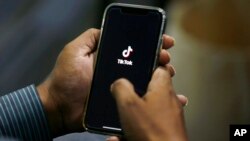Two hearings at high courts in Pakistan in July are being viewed as a further sign of the eroding digital rights in the country.
In Islamabad, a submission to the high court said that telecom companies had been ordered to install a mass surveillance system. And in Peshawar, the Chinese social media app TikTok told the high court it would allow the Telecoms Ministry access to remove content deemed “blasphemous.”
Digital and free expression advocates criticized the moves. Haroon Baloch, a digital rights activist at Bytes for All, said mass surveillance has no place in a democratic society.
“Physical or online surveillance needs a legal justification. The government should justify the need and gauge for online surveillance,” he told VOA.
The Islamabad case focuses on the surveillance of citizens whose phone calls were recorded and later released on social media, the news website Dawn reported.
Among those affected are the wife of former leader Imran Khan and the son of the former chief justice, both of whom petitioned the courts over their leaked calls.
A submission to the court said that Pakistani telecom companies were ordered to “finance, import, and install” a Lawful Intercept Management System at a surveillance center for the use of designated agencies.
In Pakistan, “agencies” often refer to the country’s powerful intelligence service.
The court noted that the software provides the ability to surveil up to 2% of their consumers, or 4 million citizens, “at any given time.”
People will lose their privacy through such surveillance, said Aftab Alam, executive director of the Islamabad-based think tank Institute for Research Advocacy and Development. “This [mass surveillance] is against the constitution and laws.”
Nighat Dad, who serves on Meta’s oversight board, told Dawn it was “mind boggling” that Pakistan’s telecom companies “do not feel the need to be transparent towards their own consumers.”
Separately in Peshawar, TikTok told the court on July 1 that it would provide access to the Pakistan Telecommunication Authority.
In that case, a petitioner is seeking a countrywide ban on TikTok for allowing what he described as “‘un-Islamic posts.”
Like Instagram, TikTok is a popular platform in Pakistan where users access it for diverse views, entertainment and marketing.
The Pakistan Telecommunication Authority did not respond to VOA’s requests for comment.
With traditional media restricted or navigating official and unspoken red lines of what can and cannot be discussed, social media offers a rare platform in the country for independent or diverse views.
Issues off limits, including for broadcast journalists, include subjects that go against anything deemed as “national interests,” as well as missing persons, criticism of the armed forces, voices of dissent, and the Pashtun Tahafuz Movement or PTM. After an army spokesperson said in 2019 the media should avoid giving coverage to the PTM, most local stations stopped reporting on the movement and its rallies.
But as more viewers turn to social media, Pakistan has seen more restrictions on digital platforms.
The Pakistan Telecommunication Authority banned X after users on the platform questioned the transparency of February elections.
The ban was not announced formally, but officials told a high court in April it was imposed “in the interest of upholding national security, maintaining public order and preserving the integrity of our nation.”
The social media platform can still be accessed via VPN.
Digital rights activist Farieha Aziz told VOA that Pakistan is moving toward greater “control” of the technology sector. As a result, she said, “We will have to suffer.”
This article originated in VOA’s Deewa and Urdu services.















